Treatment Options
Offering a full spectrum of cardiac services – including screening and diagnostic tests, advanced medical and surgical treatments, and cardiac rehabilitation and education programs – our Webster Heart and Vascular Center provides superior care, and we do it with heart. By the numbers: we perform over 2,500 catheterizations and electrophysiology procedures, and over 74,000 non-invasive cardiovascular diagnostic procedures each year.
Heart & Vascular Services
The Heart and Vascular Center at Huntington Hospital offers the following cardiac services and programs.
We provide a full range of cardiac and vascular diagnostic and interventional services to patients with coronary artery disease. Our multidisciplinary team provides an unparalleled level of care 24-hours-a-day, seven days a week. In addition, a nurse navigator provides ongoing support and educational services designed to reduce the risk of another cardiovascular event to all patients receiving cardiac procedures.
For more information, or to make a referral please call (800) 903-9233.
Our Services
We have a dedicated family waiting room and three catheterization laboratories complete with state-of-the-art technology, including digital, high-resolution radiography and a bi-plane angiographic system. Our interventional cardiology services include:
- Treatment of coronary artery disease, including:
- Angioplasty / percutaneous transluminal coronary angioplasty (PTCA)
- Stent (PCI)
- Atherectomy (rotoblator procedure)
- Intravascular lesion assessment (IVUS/OCT/FFR)
- Treatment of peripheral vascual disease
- Diagnostic vascular and peripheral vascular angiography
- Peripheral artery angioplasty, atherectomy, and stent placement
- Carotid artery stent placement
- Thoracic endovascular aortic repair (TEVAR)
- Endovascular repair of abdominal aortic aneurysm (EVAR)
- Venous angiography, thrombectomy, and angioplasty
- Treatment of varicose veins
- Pulmonary artery thrombectomy
- Structural heart disease treatment, including:
- Valvuloplasty
- Transcatheter aortic valve replacement (TAVR)
- Closure of holes in the heart, including ASD/PFO/PDA
- Hemodynamic evaluation of pulmonary hypertension and vasoreactivity
- Advanced heart failure treatment, including:
- CardioMEMS
- Implantable cardioverter difibrillator (ICD)
- Bi-ventricular (BI-V ICD)
- Subcutaneous ICD
- Electrophysiology services
- Permanent pacemaker placement
- Leadless pacemaker placement
- Implantable loop (arrhythmia) recorder
- Electrophysiology studies and mapping of the heart
- Arrhythmia management (radio frequency ablation)
The Highest Standards
- We serve as a designated ST-elevation myocardial infarction (STEMI) receiving center for Los Angeles County, and consistently exceeds national standards for time-to-treatment.
- We achieved a distinctive five-star rating in national quality indicators and is among the top performing heart centers in the country in heart-attack care.
- Quality outcomes are benchmarked against the American College of Cardiology for all diagnostic and interventional procedures performed in the catheterization lab.
- We were the first hospital in the San Gabriel Valley to utilize the newly-approved drug-eluting stent for the treatment of coronary artery disease.
Our Cardiothoracic Surgery Program offers invasive and minimally-invasive surgeries for patients with diseases of the heart, lungs, esophagus, and chest wall.
For more information, please call (800) 903-9233.
Surgical Procedures
Our dedicated heart team and surgical suite are on call 24-hours-a-day, seven days a week. The cardiothoracic surgery team consists of board-certified cardiothoracic surgeons, board-certified anesthesiologists, advanced practice nurses, and technologists. Our surgeons and clinical staff offer comprehensive state-of-the-art surgical procedures, including:
- Adult cardiac and thoracic surgery
- Aortic stents and aortic repair
- Endoscopic vein harvest
- FlowTriever® for the treatment of pulmonary embolism
- Minimally-invasive cardiac surgery
- Valve replacement and repair (TAVR)
- Video assisted thoracoscopic surgery (VATS)
- Robotic assisted surgery
- WATCHMAN™ Left Atrial Appendage Closure device for patients with atrial fibrillation (AFib)
Support Team
The Cardiothoracic Surgery Program includes a dedicated clinical nurse specialist who provides education and training for staff providing care to cardiothoracic surgical patients postoperative and in the ICU. In addition, our team of caring clinical professionals includes a dedicated nurse practitioner with a specialization in cardiac medicine who provides education, counseling, and post-discharge coordination of care for each patient to ensure they achieve the best possible outcome.
The Cardiothoracic Surgery Program is dedicated to improving the quality of care and ensuring superior clinical outcomes for all our patients. Our surgeons and clinical staff participate in ongoing clinical trials, and several of our surgeons serve as faculty members at nationally-renowned academic institutions. In addition, Huntington Hospital participates in the STS national outcomes database program and the California CABG Outcomes Reporting Program (CCORP), contributing valuable outcomes data to the research community.
We offer the most advanced invasive and non-invasive electrophysiology diagnostic and treatment services available in the industry. A multidisciplinary team of board-certified electrophysiology cardiologists registered nurses, and technologists provide care in a state-of-the-art facility equipped with digital, high-resolution radiography, 3-D mapping technology, and a bi-plane angiographic system.
For a referral to an electrophysiology physician, please call (800) 903-9233.
Services
Electrophysiology services include:
- Permanent pacemaker placement
- Leadless pacemaker placement
- Implantable loop (arrhythmia) recorder
- Electrophysiology studies and mapping of the heart
- Arrhythmia management (radio frequency ablation)
- Advanced heart failure management
- CardioMEMs
- Implantable Cardiovertor defibrillator
- Bi-ventricular (BI-V ICD)
- Subcutaneous ICD
Highest Standards
We are dedicated to advancing the practice of electrophysiology and cardiac medicine and participate in several clinical research studies. The program is led by a physician with board certification in clinical cardiac electrophysiology and cardiovascular disease, and fellowship training in electrophysiology. The electrophysiology laboratory is dedicated to continuous quality improvement and participates in the National Cardiac Device Registry.
Support Services
The electrophysiology lab provides routine services Monday through Friday, from 7:00 a.m. to 5:00 p.m.
Emergency services are provided 24-hours-a-day, seven days per week.
Vascular procedures we offer:
- CAROTID ENDARTERECTOMY: Carotid endarterectomy is a surgery to take plaque out of the arteries in your neck. Plaque is a fatty substance that can block your arteries. Neck arteries take blood and oxygen to your brain. The surgery is done to help protect you from having a stroke.
- ENDOVASCULAR AORTIC REPAIR (EVAR): Endovascular aortic repair (EVAR) is a minimally invasive surgery to repair the major blood vessel in the body, called the aorta. EVAR is used when the aorta has a disease called an aneurysm. An aneurysm is a bulge in the wall of a blood vessel. With EVAR, a device called a stent graft is used to repair the aorta. The stent graft is like a sleeve inside the aorta that lets blood flow away from the diseased area.
- OPEN AORTIC SURGERY: Open aortic surgery is a way to fix a diseased (damaged) aorta, which is the largest blood vessel in the body. A special cloth graft is put into the aorta through a small cut in the chest and stomach. The graft acts like a sleeve. Blood flows through the graft instead of through the diseased part of the aorta. This lowers the risk (chance) of the aorta rupturing (breaking open).
- THORACIC ENDOVASCULAR AORTIC REPAIR (TEVAR): Thoracic endovascular aortic repair (TEVAR) is minimally invasive surgery to repair the major blood vessel in the body, called the aorta. The aorta can be affected by a number of different diseases, including aneurysm, dissection, transection and stenosis. With TEVAR, a device called a stent graft is used to repair the aorta. The stent graft is like a sleeve inside the aorta that lets blood flow away from the diseased area.
- VEIN ABLATION: Vein ablation is a way to treat varicose veins without surgery. The doctor uses a laser or high-frequency radio waves to close veins and seal them shut.
- MICROPHLEBECTOMY: Microphlebectomy is a procedure (way) to take out large- or medium-size varicose veins through very small cuts in the leg. The cuts are so small that they do not need stitches to close them.
- PERCUTANEOUS INTERVENTION: Angiograms With Balloon Angioplasty, Stenting and Atherectomy Percutaneous intervention (PI) is a way to open arteries that are blocked or narrowed without using surgery. PI lets more blood flow to the muscle. Vascular surgeons can do these procedures on arteries of the neck, legs, arms, kidneys and abdomen (stomach).
- LEG BYPASS GRAFTS: A leg bypass graft is a surgery that is done when there is a blocked artery in the leg. A tube called a graft is sewn into the artery to replace the blocked part. If suitable, a vein from your leg or arm also could be used. A graft lets blood flow to the rest of the leg and the body.
Our Non-invasive Vascular Laboratory is a state-of-the-art facility dedicated to the diagnosis of vascular and arterial disease.
For more information, or to make a referral please call (800) 903-9233.
The lab provides a comprehensive array of services to patients requiring vascular studies, including:
- Abdominal vascular studies
- Carotid studies
- Peripheral arterial scanning
- Peripheral venous scanning
- Transcranial imaging
- Vein mapping
Vascular laboratory services are performed Monday through Friday, 6:30 a.m. to 6:30 p.m. Same-day scheduling is available through the emergency department, and testing is available 24 hours a day, seven days a week in the inpatient vascular lab. Final reports for non-emergent patients are provided to referring physicians within 24 hours of service.
Atrial Fibrillation Stroke Treatment – Left Atrial Appendage Occlusion (LAAO)
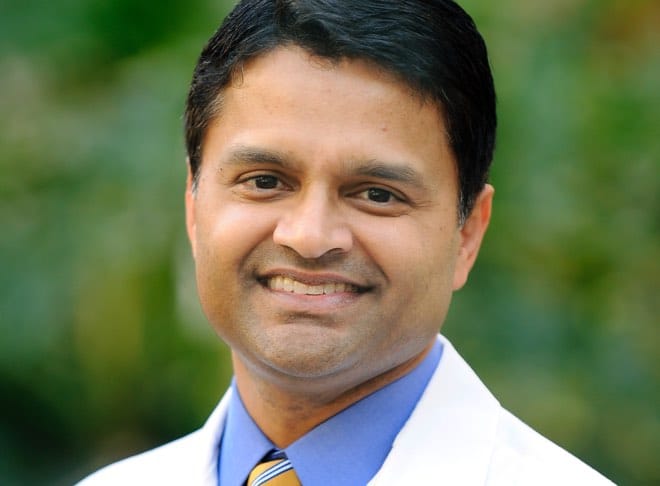
Huntington Hospital was the first facility in the San Gabriel Valley to offer the FDA-approved WATCHMAN™, Amulet, and open research study-catalyst for patients with atrial fibrillation (AFib) as an alternative to the lifelong use of warfarin or novel oral anticoagulants (NOAC) for people with AFib not caused by a heart valve problem (also known as non-valvular AFib).
“The left atrial appendage devices are a novel alternative for patients with non-valvular AFib at risk for a stroke, especially those with a compelling reason not to be on blood thinners. We provide over 2,000 catheterizations and electrophysiology procedures, and 42,000 non-invasive cardiac diagnostic procedures each year. I’m proud to now offer these safe and effective procedures to our patients seeking stroke risk treatment.”
Alex Durairaj, MD, medical director of Cardiovascular Services, Huntington Hospital.
Catheter-Inserted Left Atrial Closure Devices
Learn about WATCHMAN
The WATCHMAN device has been implanted in more than 50,000 patients worldwide and is done via a one-time procedure. It’s a permanent device that doesn’t have to be replaced and can’t be seen outside the body. The procedure is done under general anesthesia and takes about an hour. Patients commonly stay in the hospital overnight and leave the next day.
An estimated five million Americans are affected by AFib – an irregular heartbeat that feels like a quivering heart. (1) People with AFib have a five times greater risk of stroke (2) than those with normal heart rhythms. The WATCHMAN device closes off an area of the heart called the left atrial appendage (LAA) to keep harmful blood clots that can form in the LAA from entering the bloodstream and potentially causing a stroke. By closing off the LAA, the risk of stroke may be reduced and, over time, patients may be able to stop taking warfarin or NOAC.
Download these information guides to learn more about WATCHMAN, Atrial Fibrillation, and how to talk to your doctor about the best way to minimize your stroke risk.
For more information on the WATCHMAN device, please visit www.WATCHMAN.com.
The following three surgeons at Huntington Hospital are FDA and CMS qualified to perform WATCHMAN device implant surgeries.
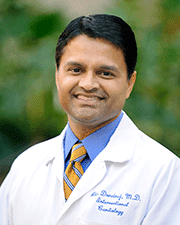
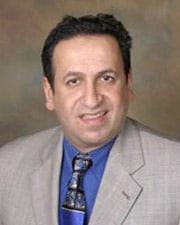
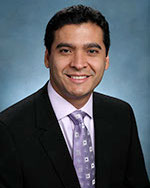
TAVR – A Minimally Invasive Innovation
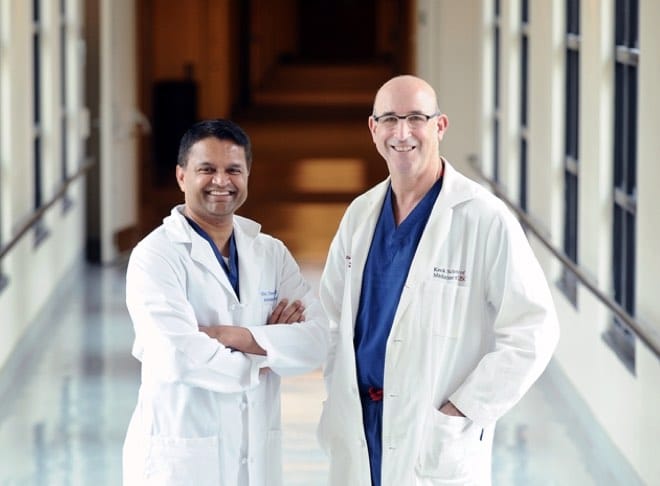
We are committed to providing our community with leading-edge cardiology care, including the groundbreaking and minimally-invasive TAVR (transcatheter aortic valve replacement) procedure.
Read more about the TAVR procedure below, or call (626) 397-2523 with any questions.
Leading the TAVR team at Huntington Hospital, Dr. Azhil (Alex) Durairaj, MD, interventional cardiologist, and Robbin Cohen, MD, medical director for cardiothoracic surgery (pictured), were the first in the San Gabriel Valley to perform the less invasive TAVR procedure.
TAVR is a minimally invasive replacement of heart valves. The TAVR procedure is a revolutionary new way to replace an aortic valve without a chest incision or the use of a heart lung machine. Studies show patients who have received this new device not only live longer, but feel better, and significantly improve their quality of life.
The TAVR procedure is performed by our dedicated Huntington Hospital heart team using the Edwards SAPIEN 3 Transcatheter Heart Valve, an FDA-approved product. During the procedure, the team inserts a valve through a small cut in the patient’s upper leg. The valve is advanced on a balloon catheter through the artery toward the native valve and leaving the new aortic valve inside the old one.
Critically, TAVR eliminates the need to open the patient’s chest or use a heart-lung machine used in traditional open-heart surgeries.
The groundbreaking TAVR technology benefits patients with significant medical issues in a minimally-invasive fashion. The aortic valve replacement procedure offers patients considered at high or moderate risk for traditional open-heart surgery an alternative treatment option.
Approximately 250,000 people in the United States suffer from severe aortic stenosis. Our team of Aortic valve specialists provide the best medical care to treat these patients. Until now, there has been no effective, long-term treatment option to prevent or delay disease progression in elderly patients with deteriorating medical conditions who may be ineligible for traditional open-heart surgery. Our team will find the right solution for you.
FlowTriever® – Lifesaving Blood Clot Remover
Huntington Hospital was the first community-based hospital in the greater Los Angeles area to use FlowTriever® for the treatment of pulmonary embolism. The FlowTriever® is the first mechanical thrombectomy device FDA-indicated and purpose-built for the treatment of pulmonary embolism, removing large clots from big vessels such as the pulmonary arteries without the need for thrombolytic drugs and consequent ICU stay.
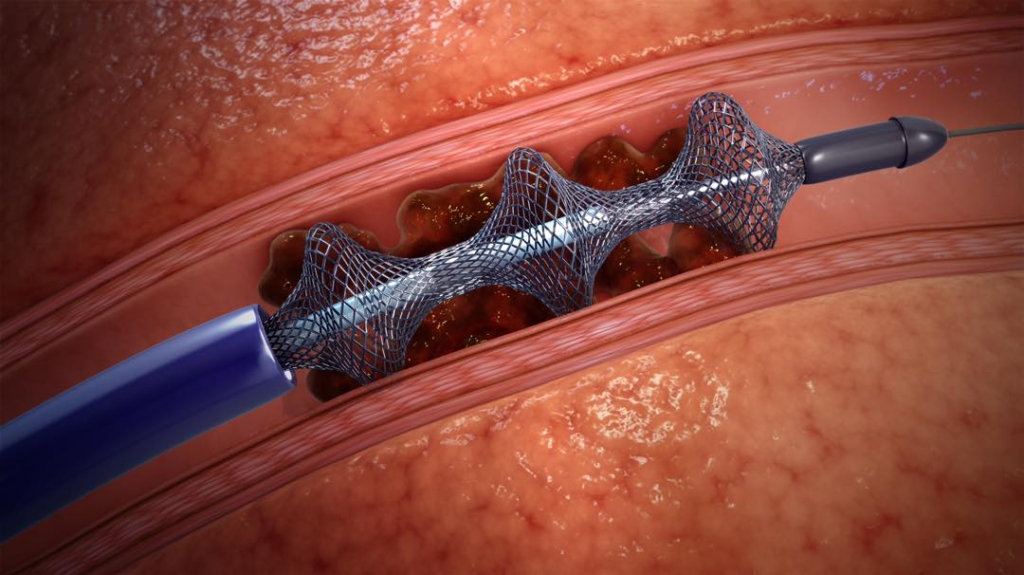
A pulmonary embolism is caused when blood clots break free in the deep veins of the body and travel through the venous system to become lodged in the pulmonary arteries. The blockage of blood flow results in right heart strain as the right ventricle is unable to push blood past the clot. In severe cases, right heart failure may occur leading to a fatal event.
The FlowTriever® procedure is typically a one-hour, single-session procedure, performed under conscious sedation. The device’s mechanism of action is to disrupt and aspirate a clot using nitinol mesh disks and large lumen aspiration Triever® catheters to rapidly remove the clot and restore blood flow. Find a cardiologist affiliated with Huntington Hospital.
Get the Cardiac Care You Need
Call us to learn more about our trusted cardiology services and to receive a physician referral.
 English
English Espanol
Espanol 简体中文
简体中文 Tagalog
Tagalog հայերեն
հայերեն 한국인
한국인 Tiếng Việt
Tiếng Việt فارسی
فارسی русский
русский 日本
日本 عربي
عربي